- Home
- Graham McNeill
Angel Exterminatus Page 9
Angel Exterminatus Read online
Page 9
It appeared to be nothing more than a light push, an indication that Fulgrim’s warrior should withdraw, but Lucius was hurled back as through struck by a siege hammer. The swordsman slammed into an arched buttress and fell to the ground in a clatter of plate and splintered stone. Lucius rolled onto his back, struggling to breathe, his lungs battered empty and his organs reeling from the force of the impact.
‘Touch one of my warriors again and next time I won’t be so gentle,’ said Perturabo.
Fulgrim laughed and clapped his hands.
‘Wonderful, brother,’ grinned Fulgrim. ‘A perfect application of force.’
Kroeger rolled upright, ready to finish what Perturabo had started, but the primarch’s hand on his shoulder kept him immobile. Again, the gesture was apparently casual, but Kroeger felt the implacable strength behind it, and his killing rage only reluctantly diminished from furious anger to simmering hate. Across the chamber, Lucius climbed to his feet and returned the compliment, but the tiniest shake of Fulgrim’s head dissuaded him from further violence. The swordsman grinned and rolled his shoulders as through preparing for a bout.
‘Let me kill him, my lord,’ said Barban Falk, his monstrous gauntlets curling into fists.
‘No, he’s mine,’ snapped Kroeger.
‘One at a time, or both together,’ said Lucius. ‘It’s all the same to me.’
Perturabo ignored their posturing and fixed Fulgrim with the ice-chips of his eyes.
‘You bring a xeno-breed into my fastness? What were you thinking, brother?’
Fulgrim looked surprised and drew the eldar to his side. ‘You always were too puritanical in your hatred of our galactic neighbours, Perturabo. Trust me, Karuchi Vohra’s people are no threat to us. Their empire is dead and gone, and its people are faded ghosts clinging to the edges of existence with bloodied fingernails.’
‘You hold a poisonous serpent by the tail, brother,’ warned Perturabo. ‘We’ve fought his kind before and they are treacherous. They’re small and frail, but don’t make the mistake of underestimating them.’
‘I too have fought them. The very best of them,’ said Fulgrim, his eyes alight at the memory. ‘I crushed the life from one of their gods and know there is nothing to fear from the scraps of their pitiful remnants. No, Karuchi Vohra is no threat to us, for he is a new breed of eldar, one who recognises the new order arising in the galaxy.’
‘What does that mean?’ asked Perturabo, his suspicion evident.
‘It means that I know true power when I see it,’ said Vohra, his voice like warm woodsmoke, and just as hard to pin down. ‘Your Warmaster will be victorious, and I do not wish to be counted among his enemies when he sits upon the throne of Terra as master of the galaxy.’
‘Do not speak to me, creature,’ Perturabo warned him. ‘I have lost sons to your kind, and I’d just as soon let Falk and Kroeger finish you.’
Fulgrim stepped between the craven eldar and Perturabo, placing a slender hand upon his arm. Kroeger’s hackles rose at the easy familiarity, the touch fundamentally unwarranted and unwelcome. The Phoenician was a primarch, a demigod worthy of devotion, but some ill-defined quality within him made him repugnant to Kroeger’s eyes. Where others beheld beauty, he saw corruption and decadence. Where his soft words were a balm to the soul for some, they were mocking insults that pricked at his urge to do violence.
‘Brother, we should not be in discord,’ said Fulgrim, his tones low and soft. ‘I come to you with an offer to unite our forces in battle on a glorious quest. One that might tip the balance of the Warmaster’s rebellion.’
Kroeger was reminded of his words to Falk on the way down the mountain, and his anger’s sharp edges were made more intense by the surge of bittersweet perfumes anointing Fulgrim’s skin. Like the lingering traces of a chemical bombardment, years after the last bomb had fallen, the alluring musks worn by the Emperor’s Children seeped into the very walls and floor. If the sickly odour was intended to reduce the tension it was failing miserably. It was mere palliative, for the underlying causes of that tension remained.
‘Tip the balance how?’ asked Perturabo.
‘Always direct,’ answered Fulgrim. ‘One of the traits I always admired about you.’
‘One you would do well to emulate,’ said Perturabo. ‘Now tell me why you have come here and what you wish of my Legion.’
Fulgrim shook his head and cast his gaze around the shadowed interior of Perturabo’s sanctum, with its ingenious trinkets, faded works of art and memories of a forgotten genius.
His brow wrinkled in distaste. ‘No, not here,’ he said, drawing one of Perturabo’s designs from the pile of architectural artwork and holding it out before him – a magnificent playhouse of the grandest proportions, with towering porticos and triumphal stairs, a fitting stage where the greatest operas and theatrical works could be played to thousands.
‘This is a tale that needs to be told somewhere with more, what’s the word? Drama! Yes, more drama, don’t you think? Build me this grand replacement for La Fenice and I will tell you everything.’
‘Build you an entire theatre just for one story?’
‘Of course,’ said Fulgrim. ‘With your construction engines, it shouldn’t take you more than a day or so. Build it for me, and I shall tell you of the Angel Exterminatus.’
In deference to the myth-cycles of his adopted home world, Perturabo had named his grand theatre the Thaliakron, which meant ‘The Dwelling of Thalia’ in the Lochosian tongue. Thalia was a deity of ancient Olympia that legends told had fired the imaginations of fools, poets and writers with poetic verse and a love of strong wine. Though open belief in Thalia had long since been put aside, lavish banquets were still held on her sacred days in the ruins of her cliffside theatre-temples; proof that mankind was ever ready to pay lip service to false gods if it provided the opportunity to revel and feast.
Her theatres had tended towards the small, for even in Olympia’s heyday, pleasures had been few and far between under the iron rule of the mountain tyrants. Perturabo had seen a chance to rectify that and conceived of a towering palace of drama, comedy, love and heroism, of murder and intrigue and endings both joyous and tragic.
One of his early designs, yet no less magnificent for that, its structure was arranged in the form of an elliptical amphitheatre, carved into an imagined excavation the depth of a sizeable meteor impact. No such location existed on Hydra Cordatus, and so the titanic earth-moving machines of the IV Legion were set to work in creating one. Soltarn Vull Bronn had identified the place most likely to split apart in the desired fashion, and Toramino’s Stor-bezashk crafted earth-breaching charges to empty a vast bowl of rock.
Concentric rings of charges shook the world, and kilometres-wide plumes of fire blasted skywards, ejecting millions of tonnes of atomised debris into space. Even as the tsunami of dust spread over hundreds of kilometres and cascades of falling rubble rained down in a precisely directed fashion, Perturabo’s earth-moving machines were moving in.
Behind a screen of dust-laden clouds and unnatural thunderheads that would persist for decades and radically alter the local micro-climate, work began on the Thaliakron. It was a titanic endeavour, one that in ages past would have required the lifespans of a dozen mortal architects and master masons.
With Perturabo and Forrix at the head of an army of labourers, craftsmen and Pneumachina engines, this work was projected to last no more than two days. The Iron Warriors bent their backs to the task also, for each was a craftsman as well as a warrior, as schooled in the arts of structural mechanics as they were in close order drill. Battle-brothers as journeymen, sergeants as artisans, officers as artificers and warsmiths as grand architects.
Perturabo knew every aspect of this building’s construction, from the exact courses required for its supporting underworks to the precise dimension of the goddess statues on its uppermost architraves. No facet of its construction was unknown to him, and as the lower levels of the structure took shape with the rap
idity of a time-lapse pict, a long-absent animation overcame Perturabo.
This was the first time one of his creations – his follies, Dammekos had called them – had been made real for the purpose it had been designed. The Nikaean structure, thankfully now eradicated from existence, still caused him great shame. It had never been intended as a place of trial and censure, but an arena for mighty games of strength and skill. The use the Emperor had made of his creation shamed Perturabo, and Magnus deserved better than to be made sport for the baying crowds whose closed minds had already placed the noose around his neck.
Forrix excelled himself, bringing his formidable talents for organisation and logistics to bear in raising the Thaliakron, manipulating a thousand tasks at once and ensuring that no stage of the construction was delayed by a previous element remaining incomplete. In peace, Forrix was a superlative overseer, in war a relentless foe who knew that wars were won, not with foolish courage and misplaced faith, but a full supply train of guns and ammunition.
Towering construction engines devoured millions of tonnes of rubble, grinding it, remaking it and finally shaping it into blocks with yoctoscopic tolerances. Towering siege cranes swung them into position, while gangs of soldiers more used to wielding lasguns took up arms with levers, rasps and chamfer-tools. Hundreds of titanic engines, more used to levelling structures, revelled in the task of bringing one to life. Like long-necked herbivores at a watering hole, the crane arms were in constant motion, a ballet of intersecting arcs that would have been recklessly dangerous had not an Iron Warriors warsmith been directing their operations.
Despite his initial reluctance to construct a grand theatre for the telling of Fulgrim’s tale, Perturabo now relished the chance to raise this building. As the hours went by, tier after tier of polished marble taken from the dismantled citadel was added to the Thaliakron, stepping down into the excavated crater like the advance of a glacier.
Fulgrim had led his carnivalian rabble to their dropsite, leaving hundreds of mutilated bodies in their wake. Burned to ash and worked into the mortar of the theatre, the bones of these men and women would forever be part of its foundations, for all drama was founded on the ghosts of the past, the dreams of the dead and foolish notions of immortality.
As day turned to night, the first ring of statues took shape around the upper perimeter of the Thaliakron: beautiful goddesses in flowing robes, bearing silver trumpets, shepherd’s crooks and masks that laughed and wept in equal measure. Tens of thousands worked on its construction, mortals and post-humans alike, for none were exempt from the inviolable logic of Forrix’s calculations and Perturabo’s demands. Like insects scurrying to build a great nest for their queen, they shaped the Thaliakron with a speed that was nothing short of miraculous.
By noon the following day, Perturabo’s vision rendered in antimony upon wax paper was made real, a brilliant white circle cut into the red flesh of Hydra Cordatus.
His irritation at Fulgrim’s abstruse motives for delaying the telling of his tale had faded with every hour spent in the work of raising the Thaliakron. His brother’s love of the dramatic had always been a source of friction between them, and this latest incarnation of his quest for perfection was confusing to a warrior of Perturabo’s direct manner. He knew something fundamental had changed within the Emperor’s Children, but could not imagine what purpose the disfigurements and degradations its warriors now sported could possibly serve.
Perhaps this joint venture would grant understanding through common cause.
Perturabo was not a primarch to whom the natural ebb and flow of friendship came easily, and, truth be told, he felt no regret at turning on those who had let his Legion bear the brunt of the hardest fighting. They had stolen the glories of open battle while the Iron Warriors were mired in the broken earth of a thousand worlds.
No, his friendship was not easily achieved, but his loyalty, once won, was as unbreakable as the hardest iron. Or so he had thought, until time and taking the metal to the stone again and again had shown him that even the hardest iron can break if worn thin enough.
With the cooling of Olympia’s mass pyres had come the realisation that nothing he could ever do from that moment could ever atone for a worldwide genocide. His father would never forgive him so grievous a sin, but Horus had not only forgiven it, he had lauded his thoroughness and dedication. Horus had sworn Perturabo never to feel guilt over what he had done to Olympia, but that was an oath easier to make than to live by. Fools claimed Forgebreaker had sealed the pact between the Warmaster and the Iron Warriors, but only Perturabo knew it was forgiveness that bound the Iron Warriors to Horus Lupercal.
It had come as a shock to find that the loyalty of a primarch was not the fixed thing Perturabo had always assumed it to be. But like all such realisations, it could be incorporated into a new worldview, and once assimilated, a series of small steps was all it took to render everything he had once stood for as little more than a fading dream.
Perturabo had vowed that his oath to the Warmaster would be truly unbreakable, no matter the cost, no matter the nature of the fight and no matter the outcome. And if that meant hearing Fulgrim out and joining him on whatever mission might hasten the Warmaster’s victory, then so be it.
With the Iron Circle at his side, Perturabo stood before the Thaliakron’s towering gates of beaten iron, and stared at the vision of the goddess worked into the ironwork pediment surmounting the magnificent, columned portico. From a narrow-necked amphora she poured wine that ran down the fluted columns in a cascade of inlaid mercury. That wine was captured by the outstretched hands of her sisters carved into the two central supports: Kharis on the left, Euphrosyne on the right. Both carried masks of laughter and sorrow, yet each was subtly turned so that it was impossible to see which was which.
Perturabo smiled, enjoying the conceit, and pushed open the gates.
The sound of a waiting audience spilled out through the gates, and pride filled his chest at the thought of this dream made real, serving the purpose for which it had been conceived. He paused within the vaulted portico, letting the sounds of cheers and revelry transport him back to a time before the galaxy had split at the seams.
Perturabo shook off his misplaced nostalgia for a time that would never come again.
‘No one lives in the past,’ he whispered. ‘Everyone is dead there.’
Fulgrim, as good as his word, was waiting for him.
Performers could take the stage of the Thaliakron from a number of artfully concealed points, but Perturabo had chosen to descend into the guts of the building and enter via a set of narrow stairs in the centre of the amphitheatre known as the Charonian Steps. This was where actors shrouded as spirits of the dead entered the dramas being played out above, but which, more importantly in this instance, allowed Perturabo to appear in the heart of the structure without warning.
From the darkness of the narrow enclosure of the undercroft chambers, Perturabo emerged into the wide open space of the theatre, and took a moment to savour one of his earliest creations finally made real. Stretching up to a height of six hundred and fifty metres, the tiered seating stepped up the gentle slope of the artificial crater, each seat perfectly arranged to provide an uninterrupted vista of the stage.
Tens of thousands filled the seats, a cheering crowd of soldiers, legionaries, hangers-on and mobs of Fulgrim’s followers. They cheered at the sight of him, and though he disliked being at the centre of such public displays, he found himself unexpectedly amused by the screaming yells of welcome.
Perturabo paused at the top of the steps and adjusted the cloak Fulgrim had given him, listening to the roars of the crowd and individual voices within it. Such were the acoustics of the space that even the softest line of dialogue could be heard by the most distant audience member, and Perturabo felt a rare flush of pride at this achievement.
Statues of the goddess and her sisters looked down from high arches that circled the amphitheatre, together with heroic actors of the time before th
e Emperor’s coming to Olympia. Thespis was rightly given pride of place at the goddess’s side, while Metrobius, his great rival, stood on the far side. Araros, the great lover of comedic poetry, rubbed shoulders with slender Hegelochus, the most chameleonic actor of his day, the so-called hero of a thousand faces.
Fires burned in scores of shallow bowls, held aloft on winged statues of ribbon-clad nymphs, each tens of metres wide and bathing the interior of the Thaliakron in a warm illumination. The air was scented with a faint chemical aroma that warred with a musky, smoky aroma of spices.
The circular stage was wide and paved with planed slabs of crushed quartz and granite, making it shimmer in the tortured glow of the irradiated clouds. No stars shone in the sky, the fallout from the short-life atomics blocking out the light from distant systems, though Perturabo’s eyes could still make out the faint smear of the violent warp anomaly of the far north-west arm of the galaxy. This close to it, Perturabo could see its tendrils distinctly, reaching out to him like questing arms, so close that it felt as though they might reach down and lift him from the surface of Hydra Cordatus.
No matter how many thousands of light years separated him from this particular warp storm, Perturabo was always aware of its presence and could perceive an echo of it on every world where he had looked to the heavens. He didn’t know whether this warp sight had been engineered into his perceptive apparatus deliberately, like Sanguinius’s wings or Corax’s eyes, or was simply a quirk of his genetic code, but it had been a blessing and a curse since his earliest memories. The storm haunted his dreams, threaded his nightmares and coloured his every thought since he had learned something of its nature.
He’d once asked Ferrus whether his silver eyes allowed similar insight, but his brother had just shaken his head and given him a look of faint scorn, as though he had just admitted to some secret weakness or vice. He had never mentioned it again.
Perturabo shook off the memory, his feelings towards it ambiguous now that Ferrus was no more, slain by the very primarch who now stood before him.

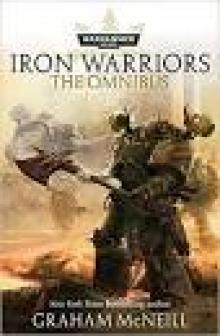 Iron Warriors - The Omnibus
Iron Warriors - The Omnibus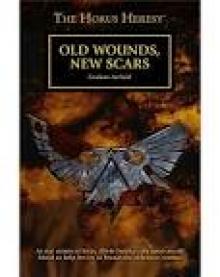 Old Wounds, New Scars
Old Wounds, New Scars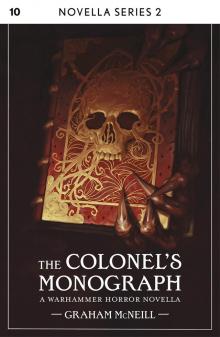 The Colonel's Monograph
The Colonel's Monograph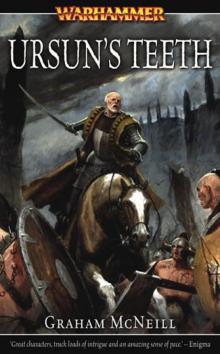 Ursuns Teeth
Ursuns Teeth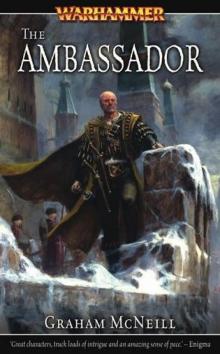 The Ambassador
The Ambassador![[Ultramarines 5] Courage and Honour - Graham McNeill Read online](http://i1.bookreadfree.com/i/03/12/[ultramarines_5]_courage_and_honour_-_graham_mcneill_preview.jpg) [Ultramarines 5] Courage and Honour - Graham McNeill
[Ultramarines 5] Courage and Honour - Graham McNeill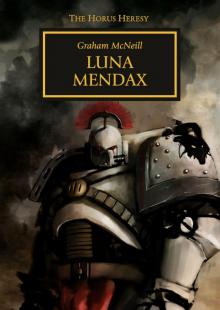 28a Luna Mendax
28a Luna Mendax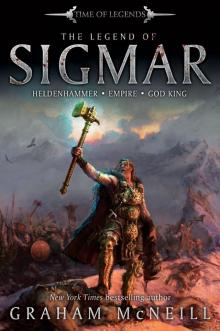 The Legend of Sigmar
The Legend of Sigmar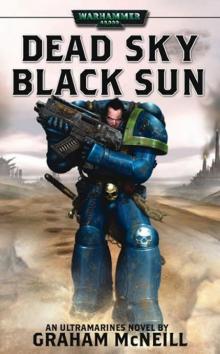 Warhammer - Ultramarines 03 - Dead Sky, Black Sun (McNeill, Graham)
Warhammer - Ultramarines 03 - Dead Sky, Black Sun (McNeill, Graham)![Warhammer - [The Ambassador Chronicles 01] - The Ambassador Read online](http://i1.bookreadfree.com/i/03/17/warhammer_-_[the_ambassador_chronicles_01]_-_the_ambassador_preview.jpg) Warhammer - [The Ambassador Chronicles 01] - The Ambassador
Warhammer - [The Ambassador Chronicles 01] - The Ambassador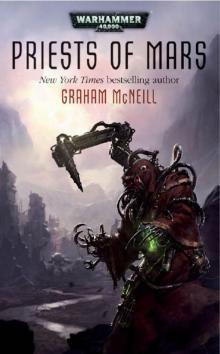 Priests of Mars
Priests of Mars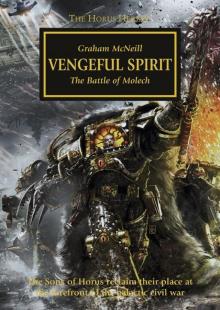 Vengeful Spirit
Vengeful Spirit![[Sigmar 03] - God King Read online](http://i1.bookreadfree.com/i/03/13/[sigmar_03]_-_god_king_preview.jpg) [Sigmar 03] - God King
[Sigmar 03] - God King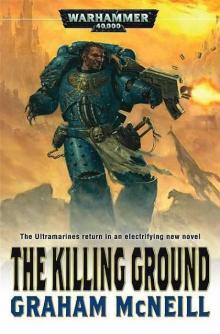 The Killing Ground
The Killing Ground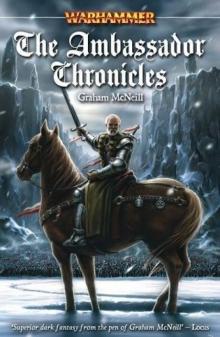 The Ambassador Chronicles
The Ambassador Chronicles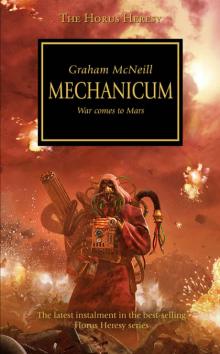 Mechanicum
Mechanicum![[Ulthuan 02] - Sons of Ellyrion Read online](http://i1.bookreadfree.com/i/03/14/[ulthuan_02]_-_sons_of_ellyrion_preview.jpg) [Ulthuan 02] - Sons of Ellyrion
[Ulthuan 02] - Sons of Ellyrion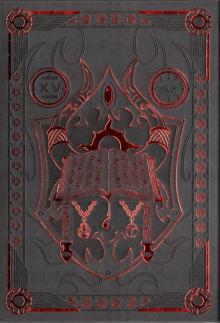 Magnus the Red: Master of Prospero
Magnus the Red: Master of Prospero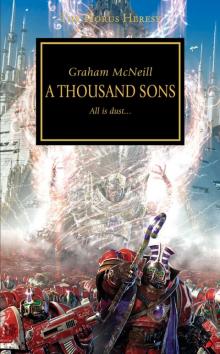 A Thousand Sons
A Thousand Sons![[Warhammer] - Guardians of the Forest Read online](http://i1.bookreadfree.com/i/03/18/[warhammer]_-_guardians_of_the_forest_preview.jpg) [Warhammer] - Guardians of the Forest
[Warhammer] - Guardians of the Forest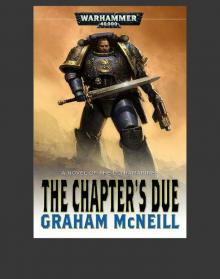 The Chapters Due
The Chapters Due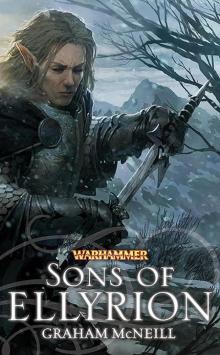 02 - Sons of Ellyrion
02 - Sons of Ellyrion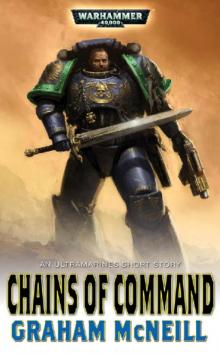 Chains Of Command
Chains Of Command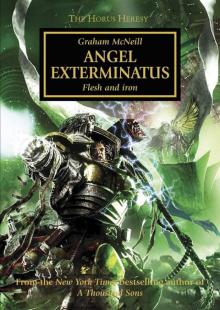 Angel Exterminatus
Angel Exterminatus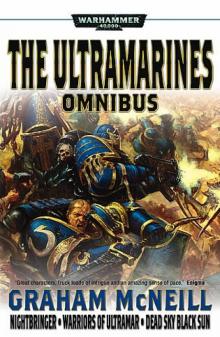 The Ultramarines Omnibus
The Ultramarines Omnibus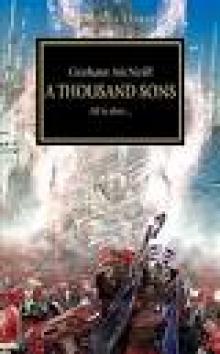 X Marks da Spot
X Marks da Spot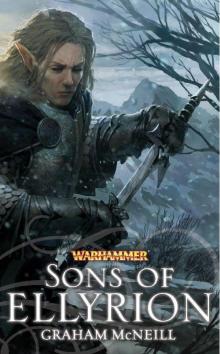 Sons of Ellyrion
Sons of Ellyrion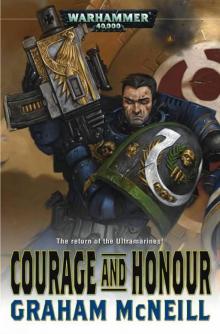 Courage And Honour
Courage And Honour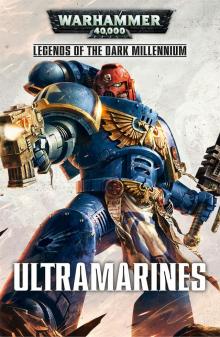 Ultramarines
Ultramarines![[Ulthuan 01] - Defenders of Ulthuan Read online](http://i1.bookreadfree.com/i/03/16/[ulthuan_01]_-_defenders_of_ulthuan_preview.jpg) [Ulthuan 01] - Defenders of Ulthuan
[Ulthuan 01] - Defenders of Ulthuan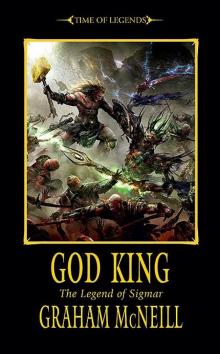 03 - God King
03 - God King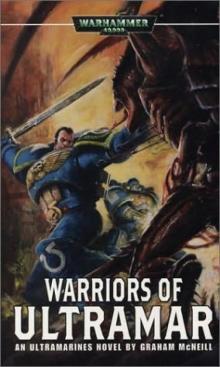 Warhammer - Ultramarines 02 - Warriors Of Ultramar (McNeill, Graham)
Warhammer - Ultramarines 02 - Warriors Of Ultramar (McNeill, Graham)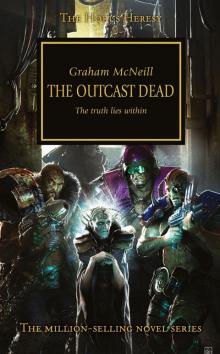 The Outcast Dead
The Outcast Dead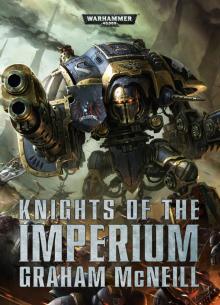 Knights of the Imperium
Knights of the Imperium Defenders of Ulthuan
Defenders of Ulthuan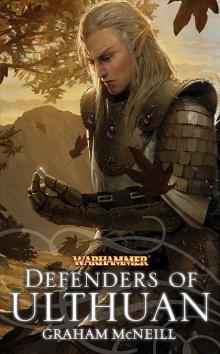 01 - Defenders of Ulthuan
01 - Defenders of Ulthuan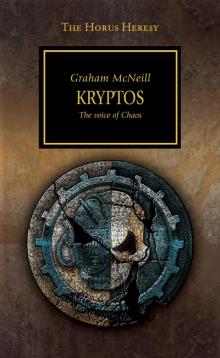 Kryptos
Kryptos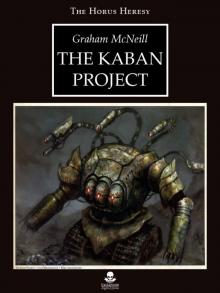 The Kaban Project
The Kaban Project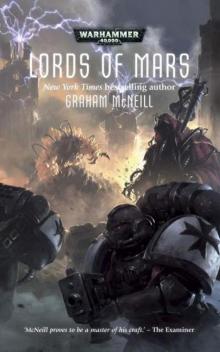 Lords of Mars
Lords of Mars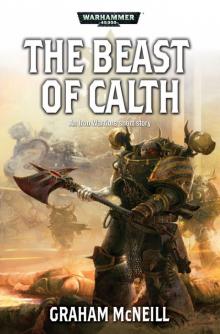 The Beast of Calth
The Beast of Calth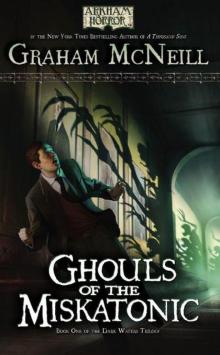 Ghouls of the Miskatonic (The Dark Waters Trilogy)
Ghouls of the Miskatonic (The Dark Waters Trilogy)![[Sigmar 01] - Heldenhammer Read online](http://i1.bookreadfree.com/i/03/24/[sigmar_01]_-_heldenhammer_preview.jpg) [Sigmar 01] - Heldenhammer
[Sigmar 01] - Heldenhammer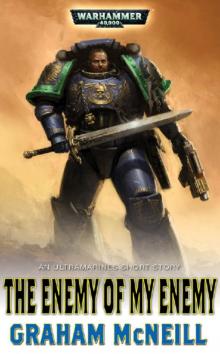 The Enemy Of My Enemy
The Enemy Of My Enemy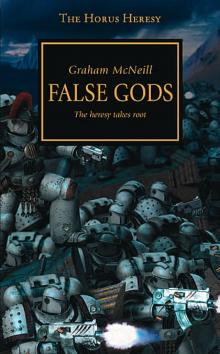 False Gods
False Gods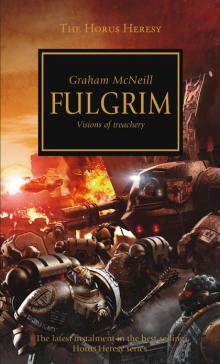 Fulgrim
Fulgrim Mechanicum whh-9
Mechanicum whh-9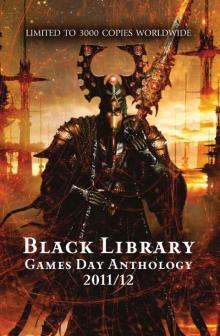 Death of a Silversmith
Death of a Silversmith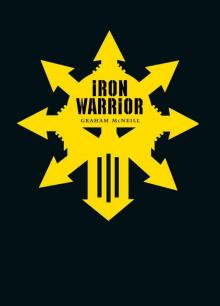 Iron Warrior
Iron Warrior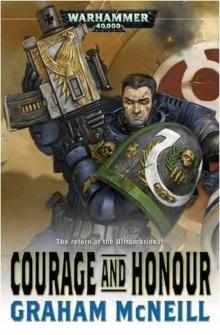 Courage and Honour w4u-5
Courage and Honour w4u-5![[Ultramarines 6] Chapters Due - Graham McNeill Read online](http://i1.bookreadfree.com/i1/03/30/[ultramarines_6]_chapters_due_-_graham_mcneill_preview.jpg) [Ultramarines 6] Chapters Due - Graham McNeill
[Ultramarines 6] Chapters Due - Graham McNeill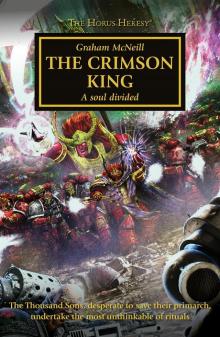 The Crimson King
The Crimson King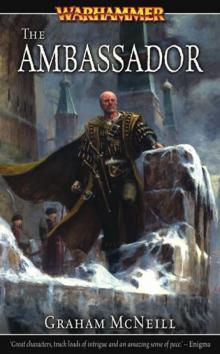 1 the ambassador
1 the ambassador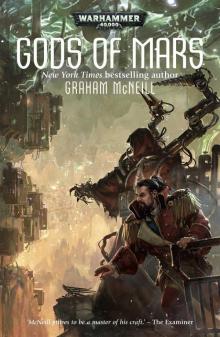 Gods of Mars
Gods of Mars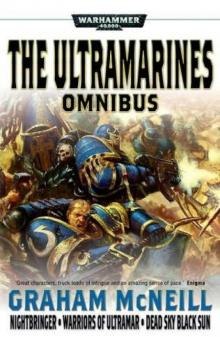 Ultramarines Omnibus (warhammer 40000: ultramarines)
Ultramarines Omnibus (warhammer 40000: ultramarines)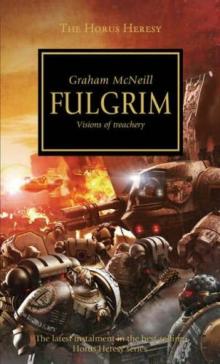 Fulgrim: Visions of Treachery whh-5
Fulgrim: Visions of Treachery whh-5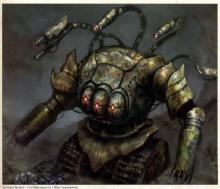 The Kaban Project (warhammer 40000: horus heresy)
The Kaban Project (warhammer 40000: horus heresy)![[Sigmar 02] - Empire Read online](http://i1.bookreadfree.com/i1/04/05/[sigmar_02]_-_empire_preview.jpg) [Sigmar 02] - Empire
[Sigmar 02] - Empire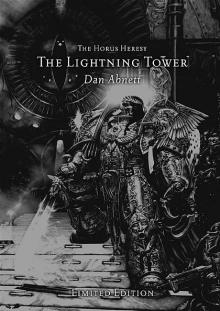 The Lightning Tower & The Dark King
The Lightning Tower & The Dark King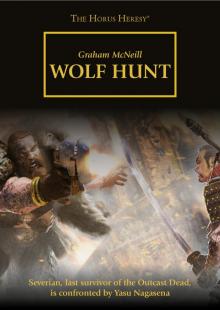 Wolf Hunt
Wolf Hunt Killing Ground w4u-4
Killing Ground w4u-4![Warhammer - [The Ambassador Chronicles 02] - Ursun's Teeth Read online](http://i1.bookreadfree.com/i1/04/05/warhammer_-_[the_ambassador_chronicles_02]_-_ursuns_teeth_preview.jpg) Warhammer - [The Ambassador Chronicles 02] - Ursun's Teeth
Warhammer - [The Ambassador Chronicles 02] - Ursun's Teeth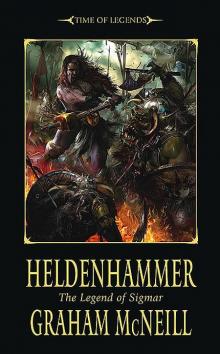 01 - Heldenhammer
01 - Heldenhammer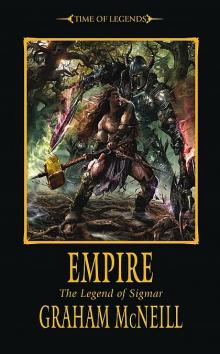 02 - Empire
02 - Empire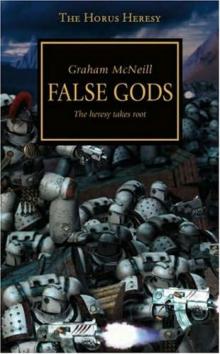 False Gods whh-2
False Gods whh-2